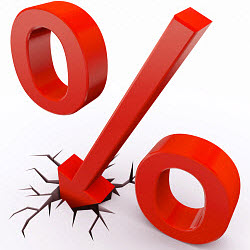When it comes to the economy, inflation and interest rates are two crucial concepts that are intertwined with each other. Interest rates refer to the cost of borrowing money, while inflation is the increase in prices of goods and services in an economy over time. One may wonder why interest rates rise with inflation. Let's delve deeper into the reasons behind this relationship.
Interest rates are influenced by a variety of factors, including inflation, economic growth, government policy, and global events. Inflation is one of the main drivers of rising interest rates because it erodes the purchasing power of money over time, and lenders require higher interest rates to compensate for the reduced value of the money they lend out.
Similarly, when economic growth is strong, demand for credit increases, which can push up interest rates. Government policy, such as changes in monetary policy or fiscal policy, can also impact interest rates. Finally, global events such as geopolitical tensions or changes in the international economic landscape can lead to changes in interest rates. Understanding these factors and their interactions can help investors and policymakers predict and respond to changes in interest rates.
Why do Interest Rates Rise with Inflation?
The correlation between interest rates and inflation has been well-established in economics. As inflation increases, the central bank of a country often raises interest rates to tackle the economic impact of rising prices. Raising interest rates helps to reduce inflation by decreasing demand for goods and services, which in turn reduces their prices. Additionally, higher interest rates make saving more attractive, reducing consumer spending and further lowering demand and inflationary pressures.
Here are some of the main reasons why interest rates rise with inflation:
To curb inflation: When inflation rises, the central bank may increase interest rates to control it. Higher interest rates lead to an increase in the cost of borrowing money, which in turn can reduce consumer spending and business investments. This decrease in spending and investment lowers the demand for goods and services, which ultimately helps to bring down prices and control inflation.
To attract foreign investment: When inflation rises, the currency of a country loses its value, making it less attractive to foreign investors. To attract foreign investment and stabilize the currency, the central bank may raise interest rates. This makes investments in the country more appealing, leading to increased foreign investment and an economic boost.
To maintain the value of bonds: When inflation rises, the future value of bond interest payments decreases, reducing the value of bonds. To keep the value of bonds stable, the central bank may raise interest rates. This leads to an increase in the future value of interest payments, which helps to stabilize the bond market.
To prevent a currency crisis: High inflation can lead to a currency crisis, where the value of a country's currency decreases rapidly. To avoid a currency crisis, the central bank may raise interest rates to attract foreign investment and stabilize the currency. Higher interest rates make the currency more valuable, thereby making it more attractive to foreign investors.
To encourage savings: When inflation rises, the value of money decreases over time. To encourage people to save money and maintain the value of their savings, the central bank may raise interest rates. Higher interest rates provide a higher return on savings, making it more attractive for people to save their money.
The relationship between interest rates and inflation is a complex one. As inflation rises, the central bank of a country may increase interest rates to manage the economic impact of rising prices. Higher interest rates can help reduce consumer spending, attract foreign investment, maintain the value of bonds, prevent a currency crisis, and encourage savings. Understanding this relationship is vital for investors, policymakers, and anyone who wants to make informed decisions about their finances.
What Happens When Interest Rates Rise?
The impact of interest rates on various aspects of the economy, including financing costs, expenditures, savings, investments, and inflation, is substantial. The effects of a rise in interest rates can be far-reaching and can affect both individuals and enterprises. Here are some of the main consequences of rising interest rates:
- Higher borrowing costs: When interest rates rise, borrowing money becomes more expensive. This can increase the cost of loans and credit for individuals and businesses. For instance, if you have a mortgage with a variable interest rate, a rise in interest rates can result in higher monthly payments. Similarly, businesses that rely on loans to finance their operations may incur higher financing costs, which can have a negative effect on their profitability.
- Decreased consumer spending: When interest rates rise, consumer spending can decline. Higher interest rates make borrowing money more costly, which can reduce a person's purchasing power. This, in turn, can reduce demand for products and services, thereby slowing economic growth.
- Lower inflation: One of the primary reasons central banks raise interest rates is to control inflation. When interest rates increase, the supply of money in the economy may decrease. This, in turn, can reduce inflation by reducing economic growth and demand for products and services.
- Increased savings: Increasing interest rates can make saving more attractive, leading to greater savings. Higher interest rates allow individuals to earn a greater return on their savings, which can motivate them to save more. This can result in a decline in expenditure and a decrease in the demand for products and services.
- Lower bond prices: When interest rates increase, the value of existing bonds decreases. This is due to the fact that investors can earn a greater return on bonds with higher interest rates. Therefore, existing bond prices must fall to make them more attractive to investors.
- Decreased business investment: When financing costs increase, it can result in a decline in business investment. Higher interest rates mean that businesses must pay more to borrow money, which can reduce their profits and reduce investment. This can then slow economic development and result in employment losses.
- Stronger currency: When interest rates increase, a country's currency may become more attractive to foreign investors. Investors can earn a greater return on their investments when interest rates are higher, which can increase demand for the country's currency. This can then result in a strengthened currency and affordable imports for consumers.
To sum up, when interest rates rise, they can have a significant impact on the economy. Higher interest rates can result in increased financing costs, which means it can become more expensive for individuals and businesses to borrow money. This can lead to a decrease in consumer spending, as higher borrowing costs can reduce people's purchasing power.
However, higher interest rates can also encourage people to save more, as they can earn more on their savings. This can lead to a reduction in spending and demand for goods and services. Moreover, when interest rates rise, the value of existing bonds decreases, which can impact investors.
In addition, higher borrowing costs can reduce profits for businesses and lead to a decrease in investment, which can slow down economic growth and lead to job losses. Finally, a stronger currency can result from higher interest rates, which can make imports cheaper for consumers. Therefore, understanding how interest rates impact the economy is crucial for individuals and businesses to make informed financial and investment decisions.
Conclusion: Does Raising Interest Rates Help the Economy?
Raising interest rates can help the economy by controlling inflation, encouraging savings, stabilizing the currency, and promoting long-term investment. Higher interest rates can help prevent inflation from getting out of control by reducing demand for goods and services. They can also encourage individuals and businesses to save more, which can lead to increased capital available for investment and stimulate economic growth. Additionally, higher interest rates can lead to an appreciation of the currency, which can reduce the trade deficit.
It's worth noting that while raising interest rates can have positive effects on the economy, it can also have negative impacts, especially in the short term. For example, higher interest rates can increase the cost of borrowing, which can reduce consumer spending and business investment. This can lead to a slowdown in economic growth and potentially even a recession.
In addition, higher interest rates can lead to a stronger currency, which can make exports more expensive and hurt the competitiveness of domestic industries that rely on exports. Therefore, policymakers must carefully consider the potential short-term and long-term impacts of raising interest rates before making any decisions. It's crucial to strike a balance between controlling inflation and stimulating economic growth to ensure a healthy and stable economy.

 Long-term mortgage rates continued to move lower this week, with a 15-year fixed-rate mortgage falling to a record low for the second consecutive week.
Long-term mortgage rates continued to move lower this week, with a 15-year fixed-rate mortgage falling to a record low for the second consecutive week. Well, well, well… what an interesting year 2013 is shaping up to be!
Well, well, well… what an interesting year 2013 is shaping up to be!



